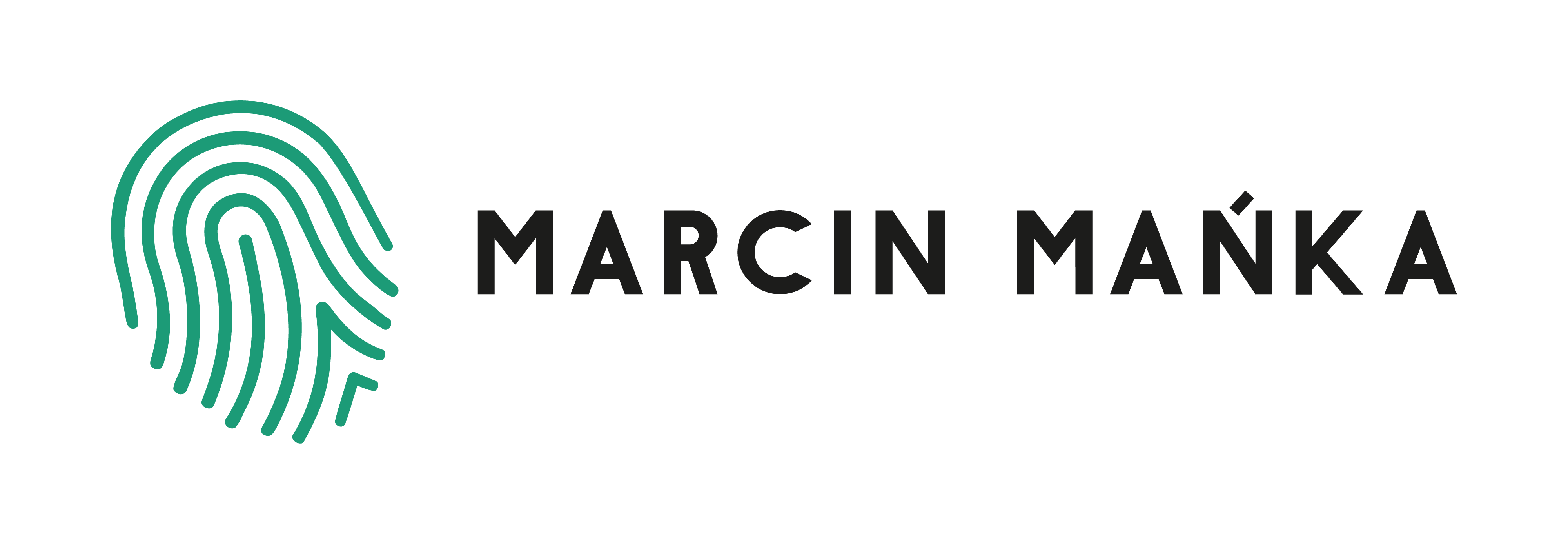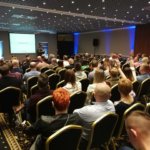lectures
Marcin Mańka
A host expert
The only psychologist, soft skills trainer and coach in Poland that combines professional education and experience in such a unique way.
Psychological (3 schools) and legal education. 17 years in the role of a presenter, among others, in Radio ZET, TVP 1, TVP Info, Polsat.
Experience in business and work in the managerial positions (sales, relationships). Conducting international events and conferences. Long training experience.
More than 190 reference letters from the largest global corporations such as Coca-Cola, Oriflame or PWC.

EXPERIENCE AND EDUCATION
- Education: psychology, law, school of psychological training, international certificate coach icf, one-year drama course, I currently write a doctoral thesis
- conducting training and advisory projects for the largest companies, cooperation with international consulting companies in the field of HR, as well as conducting many prestigious events (of European and worldwide importance), including international meetings of prime ministers, scientific and economic meetings,
- he conducted unique, on a global scale, research that showed that image of an employee has impact on perception of a company,
- more than 17 years of experience of work in media – press, radio (Radio ZET, Roxy FM, Radiostacja), and in television (TVP 1, TVP Info, Polsat, TVN), Currently – co-host of Studio LOTTO, and juror in the Polsat’s programme Make Me Over – Wielka Zmiana, psychologist expert in TV programmes such as Pytanie na Śniadanie,
- work in the sales departments in the managerial positions.
MEDIA EXPERIENCE
- Expert psychologist in TV programmes, among others, Pytanie na Śniadanie
- Juror/image expert in the programme Make Me Over – Wielka Zmiana (Polsat)
- A host of Studia Lotto
- A presenter in RadiO Zet
- A presenter in TTV – programme „Pogodny Poranek”
- A presenter in TVP 1 (programmes „Za kulisami jedynki”, „Wypasiona zima”, „Quadrans Qltury”, „Studio oprawy TVP1”)
- Conducting festival studio of Opole 2009
- TV announcer – Telewizja Polska S.A., TVN Warszawa
- A presenter in Radio Roxy FM
- A presenter in Polsat (programmes – Quizmania, Halo Kasa)
EXPERIENCE IN CONDUCTING EVENTS – selected events
- „Czech and Polish Business Mixer – Karlovy Vary International Film Festival” The meeting of the prime ministers and business people. Language: English.
- „Airtec Frankfurt – International Trade Fair for Aerospace Suppliers” The world’s leading fair of solutions for aviation industry. „Get together evening”. Language: English.
- 90th International EOS Congress The largest European meeting of orthodontists, organized every year in a different country. 5 years of preparations, 2500 participants from 72 countries. Language: English.
- „Future Internet Week” One of the most important conferences during presidency of Poland in the European Union. Language: English.
- Launching first 5G technology in Poland T-Mobile. Historical moment, many important guests from Poland and around the world. Language: English.
- „Coca- Cola Leadership Conference 2017” Gigantic conference for Coca-Cola HBC. Language: English.
- „The conferences Discovery Channel” Conducting events with the greatest stars of Discovery Channel, among others: Bear Gryll czor magician Dynamo. Language: English.
- Final Gala Event of the European Competition „Discover e-volunteering” The event closing the celebration of the European Year of voluntary Service 2011, as a part of the Program of celebration of presidency of Poland in the Council of the European Union. The organizations from 19 EU countries took part in this competition. Language: English.
- Final Gala Event of the Competition „Benefactor of the Year 2011” The competition for Polish business elite.
- Final concert for all-Poland campaign „School Bag Full of Smiles” Editions 2009, 2010, 2011, 2012.
- 42nd Convention of the Polish Association of the Neurosurgeons z Deutsche Gesellschaft fur Neurochirurgie International convention of the best neurosurgeons. Language: English.
LECTURES, TRAININGS AND COACHING
The only psychologist, soft skills trainer and coach in Poland that combines professional education and experience in such a unique way. I conduct top-ranked lectures and trainings, both for small and medium-sized companies and the largest corporations.
LECTURES
All lectures are also available in Online Live version
A lecture can also be created at special request
Emotional compass 2.0
probably the fastest, the fullest and the best way to improve the quality of Your life and improve many skills
It is often difficult to name them … let alone effectively deal with them and consciously use them. Are you aware that emotions are the basis of every training based on psychological knowledge? Emotions affect every field of private and professional life. Is there any universal language used by all people, regardless of their background or place of residence? Yes, there is …it is emotions. Something that affects every field of life of every human. What caused that, for many years, they were not treated too seriously in personal development or business trainings?
Why did we learn rigid rules instead of flexible reactions to changing reality? The answer is simple…touching what’s the most important is the most difficult. But emotions are the basis of every training concerning the so-called soft skills, that is, those based on psychological knowledge. Some very rational people, convinced that hiding emotions is good, try to manage them. They assume that emotions should be hidden because it makes them look more professional, intelligent or rational. However, emotions act independently of our will, beliefs or expectations, they can’t be modified in any way or managed. They are more real than our thoughts and beliefs, and we use emotions to make the most important life choices. They affect our thoughts, behaviours or choices unconsciously. Therefore, we should learn how to use them. Work and contacts with other people require from us to be flexible and manage difficult, often conflictual situations, which are normal part of every relationship. Effective communication allows to unite a team, and as a result achieve better results. However, to make it happen, we must learn how to control unconscious aspects of our behaviours.
Psychoneuroimmunology
it is about how psyche affects Your body, immunity and health
Stress and not being able to cope with difficult emotions may lead to very serious health problems – both physical and mental – which has been proven in many research and articles. Even 85% of medical appointments is a result of ailments caused by stress. Psychoimmunology or psychoneuroimmunology examines the relations between psyche and nervous and immunological system and shows that this relation is gigantic. It shows that emotional states affect our health. It was shown, among others, that stress may cause emotional disorders, insomnia, anxiety and depression, excessive, traumatic stress causes a risk of PTSD (post-traumatic stress disorder) and, in specific cases, personality disorders. It also affects immunological system, digestive system, cardiovascular system, respiratory system, nervous system and endocrine system, as well as metabolism. It may cause bacterial and viral infections (flu, cold, herpes etc.), may cause inflammations, headache, muscle pains, pain in the spine, neck, shoulders, stomach, obesity, activates allergies and food intolerances, gastrointestinal disorders (heartburn, constipation, diarrhoea, ulcer), autoimmune disorders, skin diseases, sexual disorders and reduced fertility. It also affects tumours, rheumatoid arthritis, atherosclerosis, diabetes, ulcerative colitis and others. Even simple cold or long catarrh may be the symptoms of weakness caused by stress. Find out how Your psyche affects Your health, how to work on emotions, how to eat and what aspects of daily functioning should be developed to keep good immunity and health.
Psychology of intention
i.e. what you get is what you give
The lecture is a presentation of the power of intentions in business, which is specifically important in teams and in roles where contact with the customers is the basis of the job. The intention, meaning your approach, is the best way to outstanding customer service and effective sales. It allows to build long-term relations with recipients that will make the customer want to return. The acquired knowledge will also be useful in personal life.
We assume that a fast, simple and effective method of improving the quality of communication is work on the basic level, namely the level of intentions. Your approach to another person in a given situation is the reason why you want to make your best effort to satisfy that person (in this case it is the customer). Your intentions impact emotions, while emotions are quickly and unconsciously passed on to the outside and received by people you come into contact with.
As a result, the recipients quickly sense your intentions, whether consciously or not, and even experience similar states as a result of mirror neurons being activated. If you smile, most likely that smile will be returned. The psychology of intention is a great recipe for building a company image, high quality of sales and customer service, as well as simple human relations.
Present yourself
self-presentation and making a good impression on others
Self-presentation is a very deeply rooted mechanism that makes social life easier. It is an element of the daily life of everyone even of someone says that they do not care what others think of them. A number of studies allow to look at self-presentation and image building in a systemised way, showing that they can be used effectively in work.
The psychology of communication and psychology of social impact provide a great basis for developing a consistent image that, combined with some naturalness, will be the reason why you make a positive impression more often. During the short lecture, you will find out and experience how fast your image impacts the opinion people around you have relating to yourself. If you represent a company, this opinion will be immediately transferred onto the company’s image. Hence, it is worth to care for what customers and business partners think of you.
“Relax, take it easy”
that is how the ability to work with emotions and stress can bring about better effectiveness, job satisfaction, and satisfaction in private life.
Less than 15% of Poles give themselves a positive opinion about their abilities to use stress in a positive way, and almost 80% would like to learn how to use stress better. 98% of Poles declare they are under stress, including nearly 2 out of 3 at least once a week.
source: GFK, 2016
Bottling up intense emotions and worrying about everything around bring about a drop in the number of lymphocytes in blood, and also weaken their activity. Even a single episode of acute stress destroys newly formed cells in the brain.
source: source: Rosalind Franklin University in Chicago
People who had experienced acute stress at their place of work, but had not gone through severe traumas or serious diseases, had clear changes in their brains, similar to the ones that occur in people having PTSD.
source: Stockholm Brain Institute
Pressure and stress, stress and pressure, responsibility, little time, lots of things to do, different opinions at work and arguments at home, demanding projects, physical and mental strain, still more and more. Today’s world demands we be fit, committed, quick and have abilities to do many things at once which have never been the case earlier. This all is very straining. The key to function more fully and more efficiently is to understand the mechanisms controlling emotions, stress, and also to be aware of one’s own abilities and inabilities to this end. This will aid in efficiently managing in daily work and life, but also in extraordinarily emotionally difficult moments. Being short of the ability to cope with stress may bring about particularly serious health complications. If you do not believe, ask your family doctor.
Instead of treating…start preventing!
During this lecture, you will get to know stress working mechanism, the types of stress, you will find out how stress affects your health, what psychoimmunology is and, what’s the most important, how to cope with stress effectively and safely.
Do you want to order a lecture?
Contact me: marcin@marcinmanka.com
Regulamin Polityka cookies© Marcin Mańka 2022












